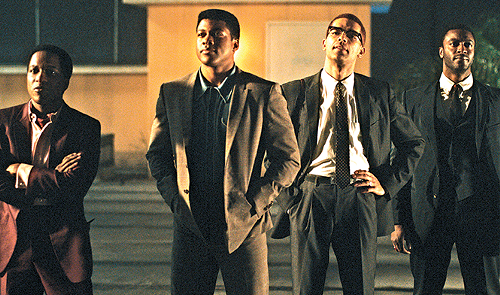A Change is Gonna Come
A meeting of four famous men digs into the nuances of activism in One Night in Miami...
By Scott Renshaw @scottrenshawWho gets to be called a real activist? It's one of the questions that has pulled at the seams of progressive movements as far back as you can imagine, and certainly has challenged fragile alliances even in the present day. There are those who want to push hard, and those who want to push gently, and the tension between "militants" and "compromisers" sometimes feels nastier than the tension between progressives and conservatives.
Kemp Powers' play One Night in Miami... uses a favorite theatrical premise—speculating on what happened during an actual historical meeting between famous figures—to dig into that question with respect for multiple possible answers. And while director Regina King doesn't always nail her attempt to make it feel like more than a filmed play, the terrific cast gives the passionate arguments enough of a spark to make it solidly intriguing.
The gathering at its center takes place in Miami in February 1964, in the aftermath of young Cassius Clay (Eli Goree) winning his first heavyweight title. Clay is on the verge of joining the Nation of Islam and becoming Muhammad Ali, guided by his spiritual advisor Malcom X (Kingsley Ben-Adir), and the two men celebrate in a local hotel with two friends who have also come for the event: football star Jim Brown (Aldis Hodge) and singer Sam Cooke (Hamilton's Leslie Odom Jr.).
Prologue material for each man sets the stage for where they find themselves as they gather, and it's here that King tries to establish some energy before events get mostly locked into one location. We get to see Cooke performing for a disinterested-bordering-on-hostile, mostly white crowd at the Copacabana, Clay showboating in a warm-up fight, Brown meeting with a casually racist fan (Beau Bridges) in his hometown and Malcolm expressing his growing disillusionment with the Nation of Islam leadership. All the context is fine, and clearly designed by Powers in his screenplay version to open up the narrative, but it's always clear that the main event is going to be once all four characters are in the same room.
And the sparks do eventually fly after the preliminaries are out of the way, mostly stemming from Malcom's desire for visible Black celebrities like Brown and Cooke use their public platform to be more vocal in support of civil rights goals. Powers' text pokes around in a lot of uncomfortable corners, like the virtues of working within The System vs. trying to blow that system up, or even the idea that lighter-skinned Blacks like Malcom might become more militant out of a kind of defensiveness. King stages most of these debates in simple shot-reverse-shot format—with a notable exception of depicting a flashback to a Sam Cooke performance that captured Malcolm's imagination—allowing the actors to dig deep into their own motivations, as well as those they're assuming in the others.
It's a phenomenal quartet of performances, each bringing something different to the ensemble. Ben-Adir's Malcom gets the front-and-center role as instigator, and the actor incorporates both a righteous sense of purpose and an uncertainty about his own next steps into the portrayal. Odom seethes through Cooke's sense that Malcom's accusing him of being an Uncle Tom, even as he wrestles with finding the right words for his own protest anthem. Hodge's low-key work as Brown might be the best of the bunch, finding a ferocious intelligence in the athlete who sees acting as the real avenue for changing perceptions. And while Goree's performance might be the least subtle of the bunch, his impersonation of Clay/Ali is so pitch-perfect that is immediately becomes the standard against which all others should be judged.
It is perhaps unavoidable that the second half of One Night in Miami... feels like a series of actorly monologues and back-and-forth debates, despite trying to mix up the locations by sending characters every once in a while to the roof of the hotel, or to a convenience store. Not every play works perfectly in a cinematic translation, and this one has its aesthetic bumps. Yet it's a thought-provoking enough text that bringing it to a broader audience is its own justification, on top of providing such plum acting roles. There's no easy answer to who gets to call themselves a real activist, but watching these characters ask the hard questions makes it fascinating to consider.
More by Scott Renshaw
-
Faces of Salt Lake County book and portrait reception
Images and personal stories in a new book reveal local demographic diversity
- Apr 17, 2024
-
Feature film review: THE BEAST
A filmmaker's compelling ideas get a bit tangled in references to his creative influences.
- Apr 17, 2024
-
Film Reviews: New Releases for April 12
Civil War, Escape from Germany, Coup de Chance, Hundreds of Beavers, La Chimera, Sting
- Apr 11, 2024
- More »
Latest in Film Reviews
Readers also liked…
-
Power Plays
Two satirical comedies explore manipulations and self-delusions by those with power.
- Aug 31, 2022




